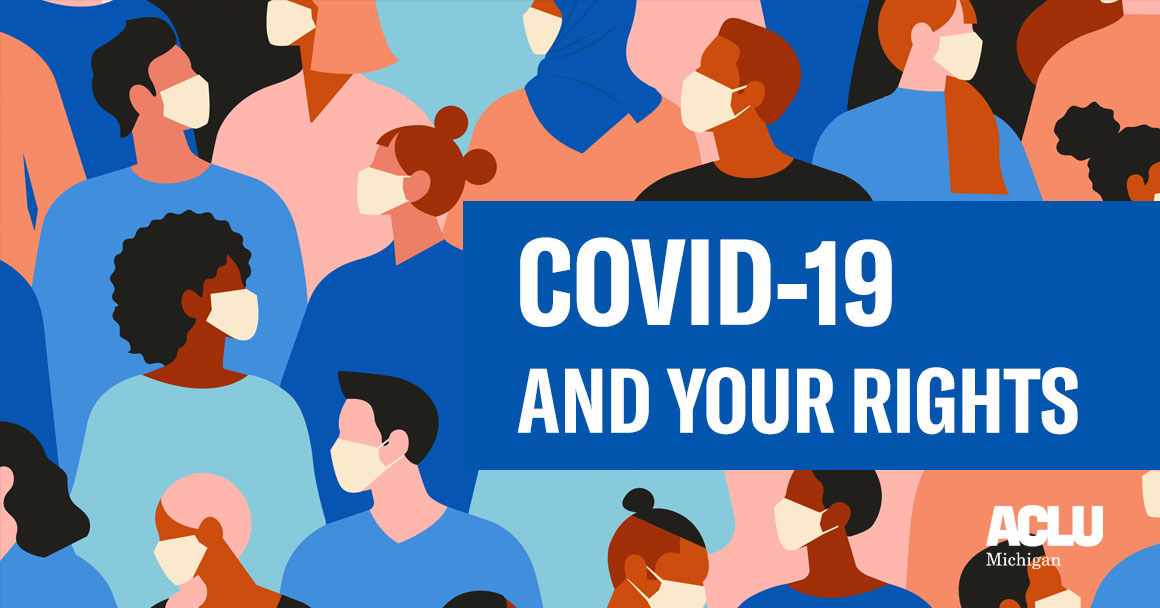If lives are to be saved, Michigan courts must immediately protect against the spread of COVID-19 by dramatically reducing jail incarceration levels.
Last week, the ACLU of Michigan sent letters to every trial court in Michigan urging them to do just that.
By reducing jail populations, courts can play a major role in limiting the spread of COVID-19, both inside our jails and in the community more broadly, but they must be bold and creative. Failure to act urgently and comprehensively will have devastating health and economic consequences, particularly for communities of color and low-income Michiganders, who are already disproportionately impacted by the criminal legal system.
Every person who is arrested and locked up is a possible source of transmission into the jail, and every moment such individuals spend in jail presents further opportunity for them to become infected in what is clearly a high-risk environment. Jails are crowded places where detainees have less ability to follow best-practice hygiene measures and don’t have the option to distance themselves from others.
To prevent an illness-spreading tragedy, the first thing courts should do is to stop using cash bail for nearly all cases during this crisis. This would protect a huge number of people. Right now, on any given day, about 8,000 people – who have not been convicted of a crime – are stuck in jail waiting for their case to go to trial. Most of them are there because they cannot afford to pay bail, the amount of money the court requires them to pay if they want to leave jail. Those who can pay, can fight their case from outside jail, can assist their attorneys with their case, and be with their families.
Given the immense health threat, there is no excuse for detaining people who have not even been convicted of crimes in a crowded jail environment. This is even more urgent, of course, in the case of people who are particularly vulnerable to COVID-19, such as the elderly and people of all ages with pre-existing conditions.
The second thing courts should do is postpone or streamline many hearings, especially sentencing hearings, for people who are not already detained. However, because criminal defendants have a constitutional right to a speedy trial, the courts must also respect that right and find solutions that let criminal trials safely move forward when the defendant wishes to do so. Allowing defendants to appear by telephone or solely through counsel at preliminary hearings are examples of steps that can be taken.
Third, courts must work with probation and parole officers to ensure that the people they supervise are not ordered to do things that could endanger their or their family’s health. Courts should refuse to issue arrest warrants at all for probationers and parolees for violating their supervision conditions. Any such arrests pose a risk to the health of people inside and outside of jails, and to the families, friends, and loved ones who would have to provide childcare or other needs to the families of people who are unnecessarily arrested.
Additionally, the collection of court debt — much of which is already unaffordable for low-income families — should be halted during this time of extraordinary economic distress and dislocation. Courts should help low-income families survive this crisis, not worsen their burdens.
Finally, courts should insist that prosecutors and local law enforcement officials minimize new arrests. No officer should arrest anyone for minor offenses like driving without insurance at this time. No court should authorize warrants for such arrests. And no prosecutor should be willing to move forward with such a case. Courts have broad powers to pressure other actors in the criminal legal system to take these types of common-sense measure and they must exercise such power without delay.
We at the ACLU of Michigan appreciate the challenges confronting public officials in responding to the COVID-19 outbreak. Many courts have begun to take some of the measures discussed here, but few have taken all of them. In this time of crisis, courts must work aggressively and proactively to minimize the number of people in our over-crowded jails to protect the health of the general public, vulnerable jail populations, and court and jail staff.


